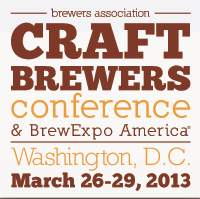 The 2013 Craft Brewers Conference (CBC) took place in the nation’s capital last week, and my record remains unblemished, because I’ve never attended a single one of them.
The 2013 Craft Brewers Conference (CBC) took place in the nation’s capital last week, and my record remains unblemished, because I’ve never attended a single one of them.
I’ve nothing whatever against it, and some day, I’ll manage to make the trip. It’s just that ever since it first dawned on me to pay attention to the CBC, there hasn’t been time to take off work to go. That’s because this particular beer guy, whom I’m told never works, somehow always finds himself busy … working, which is curious when one considers that no one else seems to be.
In fact, the past two weeks would have been better spent on a lizard schnapps bender at a Molotov cocktail bar in Pyongyang, as opposed to trying (in vain) to accomplish anything around these parts.
First there was the NCAA basketball tournament, during which compulsive bracketology creates drunken HoopZombies, wearing their colors, seemingly incapable of navigating a substantive working day until a champion is crowned.
Then followed the annual spring break week for New Albany schools, and everyone was gone with their kids to Outer Florida or the Cabela’s grand opening. The CBC further ensured absolutely no one in the craft beer industry was clocking in for the week, and as if any further excuse for slacking was necessary, Easter came early this year. Egg hunts, my butt.
What was I saying about the CBC? Right, I remember.
Opening day at CBC brought various keynote addresses, exhortations and admonitions, and the buzzword emanating most often on Twitter was “quality.” The tone seemed almost aggressive, with craft brewers being scolded to make quality beer, or else get the hell out of everyone else’s way.
Suits me, though speaking for myself, I’d rather aggressively demand that AB-InBev stop lying about its mockrobrews and get the hell out of craft beer’s way, but then again, maybe someone at the CBC actually expressed those sentiments when I wasn’t eavesdropping.
Talk about Freudian: Every time I see a Clydesdale, I think about that Godfather movie.
—
Here’s the thing about quality.
With one eyebrow raised from afar, and readily conceding the imperfect nature of electronic language, I couldn’t help detect a note of defensiveness amid the tweeted handclapping on the CBC’s first day. This actually puzzles me.
As previously noted here and elsewhere, when it comes to craft beers brewed in Indiana and Kentucky, it’s been a long, long while since I can recall tasting an egregiously wretched one as offered to me without an asterisk – for instance, a beer cellared long past its prime, and consequently faded.
Don’t get me wrong; for a brewery owner like me to argue against “quality” surely would be insanity – assuming, of course, that we’re all speaking of quality in the sense of consistency and technical proficiency, and not in the narrower context I often hear the word used (and misused), which might be classified as a judgment stemming from ideological motivations.
—
While it isn’t my custom to use this space as a promotional vehicle for my own company, in this instance a brief digression is warranted to help make my point more clearly.
Knowing that I take to heart the CBC’s urgings of quality, I believe accordingly that NABC’s beers are top of the line in terms of technical reliability. David Pierce has deconstructed and reconstructed each one, and our beers are far better for it. To me, these beers have never been more technically proficient than during the last few years. They’ve also never been of such overall depth, flair and panache — aesthetically and hedonistically speaking.
In my working life at NABC, drinking a fair quantity of our own beers, and knowing up close and personal just how well we meet (or exceed) the CBC’s rhetorical call to quality arms, it sometimes remains a challenge trying to convince individual arbiters of “quality” to actually taste the ales (and occasional lagers) of our labor.
Therefore, what I’m suggesting is that the word “quality,” as uttered from different perspectives, commonly implies quite different things, hence my puzzlement over the “quality” thread at the CBC’s opening.
Exactly how was the word intended to be taken?
In short, it’s my view that the word “quality” in any aesthetic connotation is misleading and ill-considered, because measures of objective expertise are being subordinated to parameters of personal preference, and personal preference far too often is not being derived from objective criteria of any sort; rather, it is being crowd-sourced in a frenzy of narcissistic circle jerking.
Consequently, the hypothetically finest session-strength English-style Best Bitter on the planet, one brewed to exacting quality standards, may as yet fail the aesthetic “quality” pronouncement, as paraphrased thusly:
This Best Bitter sucks because it isn’t an Imperial IPA brewed by my favorite, highly-rated brewery, and so I’m docking it accordingly in the ratings.
Obviously, that’s crap. But is the crap even obvious? That’s the part I find annoying. Naturally, we all have our personal preferences, and this is as it should be. But can’t we be a bit clearer about them, and keep objective and subjective conclusions in their respective places?
—
My personal preference these days is to look outside the craft beer tent, just past the flap, to the person standing there who looks like he’d really like to come inside, to walk past the craft beer enthusiasts already ensconced, and to let this newcomer taste the theoretical Best Bitter, because his or her reaction almost surely will not be to classify it according to someone else’s self-possessed criteria, but simply to tell me whether it tastes good, and if he or she likes it, or not. With a basis for discussion established, maybe we can begin to chat … and maybe craft beer’s market share reaches a wider audience.
Absolutely: I believe in technical quality, skill and craftsmanship; always have, and always will.
But I do not believe in subjective definitions of quality, and I will not acquiesce in systems of grading and measurement that seek (knowingly or otherwise) to impose blanket ideological conformities and tyrannies of personal narcissistic style preference on the wider world of craft beer, because I love craft beer, and I love it even more when it’s democratic and egalitarian, and not exclusionary.
It’s what those speakers at the CBC really meant, right?
I certainly hope so.





